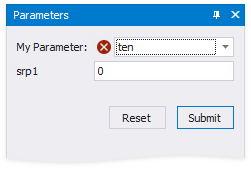StaticListLookUpSettings Class
Provides access to a report parameter‘s list of static values.
Namespace: DevExpress.XtraReports.Parameters
Assembly: DevExpress.Printing.v25.2.Core.dll
NuGet Package: DevExpress.Printing.Core
Declaration
public class StaticListLookUpSettings :
LookUpSettings,
IXtraSupportDeserializeCollectionItemRemarks
Assign an instance of the StaticListLookUpSettings class to a parameter’s ValueSourceSettings property to provide a static list of predefined values for this parameter. You can also set the parameter’s ValueSourceSettings property to:
- a DynamicListLookUpSettings class instance - to specify the storage used to retrieve the list of predefined parameter values.
- a RangeParametersSettings class instance - to specify the nested start and end parameters for a report’s date range parameter.
Use the LookUpValues property to specify the list of static values.
Ensure that the listed values match the parameter’s Type - otherwise the editor’s validation rejects the value.

Users can select a value from the specified list only. However, you can specify an unlisted value for the parameter in code.
See Parameters Overview for more information.
Example
The code sample below illustrates how to create a date parameter with a static list of predefined values and filter report data by this parameter.
using DevExpress.XtraReports.Parameters;
using DevExpress.XtraReports.UI;
using System;
using System.Collections.Generic;
// ...
void CreateDateParameter()
{
XtraReport report = new XtraReport();
Parameter myDateParameter = new Parameter();
myDateParameter.Name = "myDateParameter";
// Sets the Visible property to true to request the parameter value from users.
// Sets this property to false to apply the parameter's value that is specified in code.
myDateParameter.Visible = true;
myDateParameter.Type = typeof(System.DateTime);
// Specifies the parameter's static list of predefined values
StaticListLookUpSettings lookupSettings = new StaticListLookUpSettings();
lookupSettings.LookUpValues.Add(new LookUpValue(new DateTime(2019, 01, 01), "January 1, 2019"));
lookupSettings.LookUpValues.Add(new LookUpValue(new DateTime(2019, 02, 01), "February 1, 2019"));
lookupSettings.LookUpValues.Add(new LookUpValue(new DateTime(2019, 03, 01), "March 1, 2019"));
lookupSettings.LookUpValues.Add(new LookUpValue(new DateTime(2019, 04, 01), "April 1, 2019"));
lookupSettings.LookUpValues.Add(new LookUpValue(new DateTime(2019, 05, 01), "May 1, 2019"));
lookupSettings.LookUpValues.Add(new LookUpValue(new DateTime(2019, 06, 01), "June 1, 2019"));
lookupSettings.LookUpValues.Add(new LookUpValue(new DateTime(2019, 07, 01), "July 1, 2019"));
lookupSettings.LookUpValues.Add(new LookUpValue(new DateTime(2019, 08, 01), "August 1, 2019"));
lookupSettings.LookUpValues.Add(new LookUpValue(new DateTime(2019, 09, 01), "September 1, 2019"));
lookupSettings.LookUpValues.Add(new LookUpValue(new DateTime(2019, 10, 01), "October 1, 2019"));
lookupSettings.LookUpValues.Add(new LookUpValue(new DateTime(2019, 11, 01), "November 1, 2019"));
lookupSettings.LookUpValues.Add(new LookUpValue(new DateTime(2019, 12, 01), "December 1, 2019"));
myDateParameter.ValueSourceSettings = lookupSettings;
report.Parameters.Add(myDateParameter);
// Filters report data by the specified parameter.
report.FilterString = "GetDate([OrderDate]) >= ?myDateParameter";
}